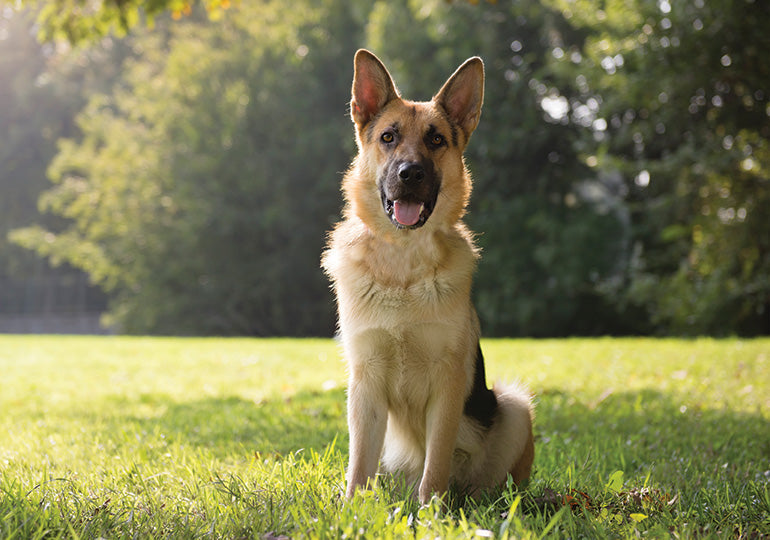
German Shepherd First-Time Owner Guide: Start Right!
Share
Welcome to the exciting world of German Shepherd ownership! As a health-conscious pet owner, you want to ensure that your new canine companion thrives in your care. This German Shepherd first-time owner guide is here to help you provide the best possible start for your furry friend.
German Shepherds are known for their intelligence, loyalty, and versatility, making them a popular choice for many households. However, owning one requires understanding and commitment. As a responsible pet owner focused on health, you'll need to pay attention to their diet, exercise, and overall well-being.

Understanding the German Shepherd Breed
German Shepherds are a breed renowned for their strength and agility. Originally bred for herding and protecting sheep, they possess an inherent drive to work, making them excellent companions for active individuals or families. To fully appreciate what it means to own a German Shepherd, it's crucial to understand their unique characteristics and needs.
According to the American Kennel Club, German Shepherds are highly intelligent and trainable, qualities that make them ideal for various roles, including service, search and rescue, and as family pets. However, their high energy levels mean they require regular exercise and mental stimulation to stay happy and healthy.
Preparing Your Home for a German Shepherd
Before bringing home your German Shepherd, it's essential to prepare your living space to accommodate their needs. This includes creating a safe environment with ample space for play and exercise. Ensure your home is free from hazards that could harm an inquisitive puppy.
Consider reading about the long-term care of adopted dogs for insights on creating a nurturing environment. Additionally, if you're living in an apartment, check out tips on German Shepherd adaptability in smaller spaces.
Diet and Nutrition for a Healthy Shepherd
As a health-conscious owner, you'll want to provide your German Shepherd with a balanced diet to support their growth and vitality. Puppies have different dietary requirements compared to adult dogs, so it's important to choose the right food for their stage of life.
High-quality, protein-rich dog food is essential for maintaining their muscle mass and energy levels. Always consult with your veterinarian to determine the best diet plan for your dog, taking into account any breed-specific considerations. For more detailed guidance, the Chewy guide on German Shepherds offers comprehensive nutritional advice.
Exercise and Training Tips
German Shepherds are active dogs that require plenty of exercise to keep them physically and mentally satisfied. Daily walks, playtime, and training sessions are crucial. Engaging in activities such as obedience training, agility courses, or even simple games of fetch can be beneficial.
Training is vital not only for discipline but also for mental stimulation. Consistent, positive reinforcement methods work best with this intelligent breed. You may also explore resources on breed characteristics to tailor your training approach effectively.
Health Considerations for German Shepherds
Like all breeds, German Shepherds are prone to certain health issues. Regular veterinary check-ups and preventive care are essential. Common concerns include hip dysplasia, elbow dysplasia, and digestive issues. Being proactive about their health ensures a long, happy life for your dog.
Understanding the puppy growth stages can also help you anticipate and address health challenges early on. Keep an eye on their weight, coat condition, and behavior for any signs of underlying issues.
Socialization and Behavioral Insights
Socialization is a crucial aspect of raising a well-rounded German Shepherd. Introduce them to various environments, people, and other animals from an early age to build confidence and reduce anxiety. This process helps prevent unwanted behavioral issues such as aggression or excessive shyness.
Additionally, understanding the differences between male and female German Shepherds can help tailor your approach to socialization and training, as there can be distinct personality traits based on gender.

Frequently Asked Questions
What is the best diet for a German Shepherd?
A balanced diet rich in protein, healthy fats, and essential nutrients is ideal. Consult your veterinarian for personalized dietary recommendations.
How much exercise does a German Shepherd need?
German Shepherds need at least 1-2 hours of exercise daily. This can include walking, running, playing, and training sessions.
Are German Shepherds good with children?
Yes, with proper training and socialization, German Shepherds can be excellent family pets and are generally good with children.
This article contains affiliate links. We may earn a commission at no extra cost to you.
